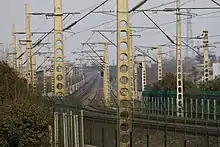Xi'an–Ankang railway
The Xi'an–Ankang railway or Xikang railway (simplified Chinese: 西康铁路; traditional Chinese: 西康鐵路; pinyin: xīkāng tiělù), is a single-track, electrified railroad in Shaanxi Province of China between Xi'an, the provincial capital, and Ankang. The line is 247.7 km (154 mi) long and was built from 1995 to 2001.[1] As of June 2009, a second track is being planned for the line.[2] Major cities and towns along route include Xi'an, Zhashui, Zhen'an County, Xunyang County and Ankang.[1]

History
Construction on the line began on 18 December 1996. The railway opened on 8 January 2001. The second track was completed and put into operation on 31 October 2013.[3]
On 5 November 2018, a new double-track 35.5 kilometres (22.1 mi) long line from Dalingpu to Ankang was opened. This line bypasses Xunyang North railway station, shortening the distance between Xi'an and Ankang by 27 kilometres (17 mi) and increasing capacity. The line has a design speed of 160 kilometres per hour (99 mph).[4]
In December 2020, new direct services were introduced between Xunyang railway station and Xi'an railway station. Previously this journey required a change at Xunyang North. These services are operated by China Railway CR200J units.[5]
Line description

The Xikang line traverses the Qin Mountains, one of the geographic barriers that separate North and South China. Xi'an, the provincial capital is located in the Wei River Valley and Ankang in southern Shaanxi is located in the Han River (Yangtze River tributary) Valley. The Xikang line connects two of China's major east-west rail corridors, the Longhai railway and the Xiangyang–Chongqing railway and shortened travel distance between the two cities by 542 km (337 mi) and travel time by 14 hours.[1] Due to the rugged terrain of southern Shaanxi, the line has 41.2 km (26 mi) of bridges and 139.6 km (87 mi) of tunnels including the Qinling Tunnel, which is 18.5 km (11 mi) long and 1.6 km (1 mi) underneath the mountain at its deepest point.[1] The line was funded by low-interest development assistance loans from Japan.[1]
Rail connections
References
- Mitsue Mishima, "Xi’an–Ankang Railway Construction Project (1)-(3) (CXVII-P73, CXVIII-P73, CXIX-P73)" OPMAC October 2004
- (Chinese) "西康铁路将建复线" Xinhua 2009-06-12
- "史上今日:2001年1月8日 新世纪诞生的第一条铁路新线—西康铁路通车运营-科普中国". www.xinhuanet.com. Retrieved 2020-12-31.
- "西康铁路实现全程双线运行 输送能力有望达1亿吨-新华网". www.xinhuanet.com. Retrieved 2020-12-31.
- "好消息!西安-旬阳6日起开行"绿动车" 运行时间2小时左右 - 西部网(陕西新闻网)". www.cnwest.com. Retrieved 2020-12-04.